Clients' first apartments are located in affordable living complex for seniors, disabled people
By JULIE MINDA
PHOENIX — As the mother of a son with severe autism, Denise Resnik often worried about the day Matt would graduate from high school and age out of comprehensive education and support services. What would happen when the school bus stopped coming? Could her son be guided to achieve some modicum of independence as he moved into adulthood?
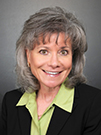
Resnik
Resnik wasn't about to leave that to chance. In 1997, when Matt was 6, she joined a pediatrician and another mother of a child with autism in founding the Southwest Autism Research & Resource Center here as part of her decades-long search for answers and opportunities for Matt.
Early on, Resnik and the center turned their attention to housing for adults with autism, and, in 2012, Resnik founded First Place AZ as a sister nonprofit focused on developing residential properties that would provide on-site supportive services for adults with autism and other special needs.
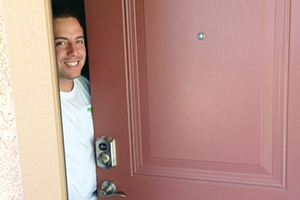
Ian McCoy greets a guest at his apartment door in the 29 Palms complex in Phoenix. He and his roommate are among 16 young adults with autism learning skills necessary for independent living through a program offered by First Place AZ.
Last year, First Place AZ welcomed its first cohort of eight men (no women had applied for that cohort), who moved into its first set of apartments specially designed for people with autism. The units, which have two occupants each, are located at
Phoenix's 29 Palms, an affordable living complex that primarily serves senior adults and people with disabilities. 29 Palms is owned, developed and managed by the Phoenix-based Foundation for Senior Living.
All of the First Place residents of 29 Palms get on- and off-site supportive services. First Place's Transition Academy students attend a two-year course for life skills training. When the two years are up, they'll move on to other independent living arrangements, according to the plan. (The support services also aid individuals like Matt Resnik, whose level of disability precludes independent living.)
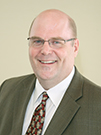
Hastings
Steve Hastings is chief of real estate services for the senior living foundation. He said that several generations ago, most people with disabilities lived in institutions. But, beginning in about the 1960s, parents increasingly opted to care for disabled children at home. As the parents approach old age and more disabled children reach adulthood, "society in general has not made plans for how to take care of these men and women after their parents are gone.
"We need to figure this out," Hastings said. "The most affordable approach seems to be to layer them into new and existing developments," one of the approaches taken by First Place. The organization is backed by Phoenix-based Dignity Health St. Joseph's Hospital and Medical Center, which has provided advice and community connections for First Place.
Tailored environment
A completely renovated garden apartment complex, 29 Palms is configured in a square, with apartment units on three sides, a community center and offices on the fourth side and a grassy courtyard and outdoor gathering space in the middle that is a popular hangout for residents — those with autism, and those without. The eight apartments for adults with autism are mixed in with the 13 units for other Foundation for Senior Living tenants.
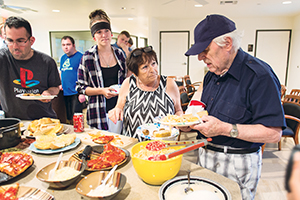
Residents of 29 Palms enjoy a communal dinner at a gathering area at the complex in Phoenix.
Photo by: Stephen G. Dreiseszun/Viewpoint Photographers
Hastings said, "The older residents have the time and desire to work with the younger adults. I am increasingly impressed and grateful for the relationships we see develop between the two populations."
Each First Place apartment at 29 Palms has two bedrooms, a kitchen, a living room and a bathroom. Each is tailored to the needs of people with autism. For instance, Hastings said, people with autism may be hypersensitive to noise, so the First Place apartments have quiet appliances and sound-suppression design elements to dampen or eliminate startling or distracting noises.
Building independence
Eight First Place participants enter the housing program each year. They are chosen in part based on their potential to live independently, said Paige Raetz, residential director for the resource center and operations manager for the First Place Transition Academy. She said to be accepted into the program, applicants must be able to communicate their wants and needs, they must not require around-the-clock individual support and they must want to live independently after completing the academy program.
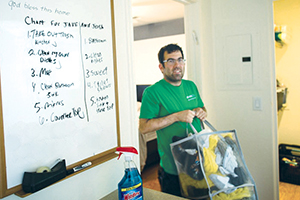
Josh Kluger, a First Place student, returns to his apartment at 29 Palms, laundry in tow.
Photo by: Stephen G. Dreiseszun/Viewpoint Photographers
From the first day they move into 29 Palms, the First Place residents are preparing to transition to the larger world. They work with First Place staff to make a life and work plan. They take Transition Academy classes at Phoenix's GateWay Community College to learn how to pay bills, maintain a bank account, use public transportation, shop, and communicate and socialize with others. They learn what employers expect of employees.
More than 75 collaborating organizations provide funding, services and other support to First Place, and some of these organizations offer paid employment and internships to First Place participants. First Place participants work at doughnut shops, coffee shops, at the Arizona Diamondbacks' Chase Field and CVS Pharmacy.
The resource center's transition specialists are on-site at 29 Palms from 7 a.m. to 11 p.m. daily. They mentor the residents and teach them to navigate apartment living, including cooking, cleaning and resolving maintenance issues with 29 Palms' staff. One designated supportive neighbor is on call every night in case a First Place resident needs assistance.
First Place residents must pay academy tuition and rent that amounts to $42,000 annually. First Place scholarships are available on a limited basis.
Two cohorts of First Place residents now live at 29 Palms. Their ages range from 18 to 36. Twelve of the 16 are men. Many are on Social Security and Supplemental Security Income disability.
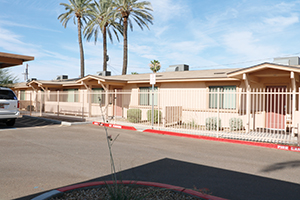
First Place and the Foundation for Senior Living renovated the 29 Palms apartment complex, using green building design.
Ian McCoy, 21, is in the inaugural First Place cohort. He said the interaction he has through the program "definitely builds up my self-esteem and personal relationships." He's learned to live on his own and succeed at his job at the Fractured Prune Doughnuts shop in downtown Phoenix. Next year, he hopes to rent an apartment with two friends from the program.
Senior friends
Communal meals and other activities at the complex encourage mingling among the Foundation for Senior Living residents and those with autism. Residents tend a vegetable garden together, and go on the occasional outing together to a museum or park.
But most of the interaction is informal. The young adults help the elder residents with daily tasks, and the seniors may offer conversation and advice to their young neighbors.
Marisue Garganta directs community health integration and community benefit for St. Joseph's. She made the initial introduction between Resnik and the Foundation for Senior Living that led to the groups' synergy at 29 Palms. Garganta said elderly residents, especially those who don't have family nearby, are glad for the opportunity to interact with young people. It reduces their feelings of isolation.
Next expression
In December, First Place will break ground on a supportive housing apartment property called First Place–Phoenix. As at 29 Palms, its goal will be to transition adults with special needs and teach them independent living skills.
The new property will have 50 apartments for people with autism or other disabilities who do not require around-the-clock medical assistance. The property also will house a Transition Academy enrolling 32 students annually, and a leadership institute for educating and training support service providers, medical professionals and the broader community.
Many of the support services for residents will be on-site at First Place-Phoenix. Clinicians will come to the facility to provide health and wellness support to the residents; St. Joseph's plans to be one of the facility's top providers. Also, some medical residents from St. Joseph's will live on a temporary basis at the property as part of a fellowship program, as will some other service providers.
Once First Place–Phoenix opens, Transition Academy participants will spend their first year there, and then move to 29 Palms for their second year.
Resnik said, "We all need others who care about us. The best gift of this collaboration has been demonstrated in the most authentic way, in how these special populations have come together to care for and about each other."
| St. Joseph's-First Place collaboration includes clinical services, research Phoenix-based Dignity Health St. Joseph's Hospital and Medical Center has helped First Place AZ founder Denise Resnik and her team build the connections needed to establish the organization for adults with autism. St. Joseph's has been advising them on launching and running their nonprofit, connecting them with potential governmental and philanthropic funding sources and linking them with clinical experts at the hospital to set up services for the adults with special needs. St. Joseph's plans to become one of the primary health care providers to First Place students and residents and for the broader Phoenix special needs community, according to Marisue Garganta, director of community health integration and community benefit for St. Joseph's. St. Joseph's Barrow Neurological Institute of Phoenix expects to provide neurological assessments and other services to First Place residents. Garganta said, "We also intend to engage other specialty services to meet the growing needs of this population as well as train staff and providers on culturally sensitive delivery (of care to) individuals with autism spectrum disorders." St. Joseph's is exploring how it might use telehealth to provide some services to residents of First Place - Phoenix, a residential facility for adults with autism or other disabilities that First Place AZ will break ground on later this year. The St. Joseph's-First Place collaboration also involves a research component. First Place clients living in the 29 Palms apartment complex in Phoenix are among the subjects of a longitudinal study on brain changes in autistic adults underway now. |
| First Place surveys clients and 100 residential properties across the U.S. First Place AZ's founders developed the organization's approach to supporting people with autism in large part by studying programs already in place nationwide and by conducting focus groups with people with autism and their loved ones. Denise Resnik said before giving shape to the nonprofit provider of housing options for adults with autism, she and other organizers joined academic, state housing and other organizations to study about 100 housing complexes nationwide that include supportive services for people with autism and other special needs. The Southwest Autism Research & Resource Center that Resnik had previously founded and its partners also held focus groups and town halls with people with autism as well as with their families and autism experts. Resnik and the center's staff used what they learned to establish First Place AZ. First Place hired as its program director Jeff Ross, who had retired after running a Taft, Calif., Community College program that transitions adults with autism and other developmental disabilities into independent living. First Place's founders had evaluated that Taft program during the study phase preceding First Place's founding; they used the Taft program as a model for First Place and incorporated learnings from other programs they evaluated. Ross said that more than 350 people have graduated from Taft's two-year skill-building residential program. He said 95 percent of graduates now live independently, 89 percent are employed and 88 percent are financially independent from their parents. First Place hopes to have similar success rates with the graduates of its skill-building program. |
| Early interventions have long-term benefit for people with autism Autism runs along a spectrum from mild to severe. According to the Southwest Autism Research & Resource Center, autism can manifest at virtually any age, but the signs and symptoms tend to emerge between 2 and 3. Autism can be associated with social impairments, communication difficulty and repetitive patterns of behavior, says information from the resource center. In very young children, indicators can include poor eye contact, lack of social responsiveness and difficulty interacting with others. In older children and adults, indicators can include impaired ability to make friends or sustain conversations with others. While there is no cure for autism, early intervention can improve people's potential for progress, so that they "can live meaningful and productive lives with varying levels of assistance," according to information from the center. Experts recommend skill-building activities and applied behavior analysis as promising interventions. Applied behavior analysis uses instruction and environment changes to improve behaviors. The success of these and other interventions is largely dependent on a person's level of impairment. |
| Phoenix autism organizations featured on 'PBS NewsHour' "PBS NewsHour" recently featured the Phoenix autism organizations founded in part by Denise Resnik. In a two-part program, the public television show examines how adults with autism are benefitting from First Place AZ and from the Southwest Autism Research & Resource Center. Part one follows several men with autism as they learn to live independently at the 29 Palms housing development and to use their skills in paid employment in Phoenix. Part 2 profiles the Resniks. Matt Resnik, a 25-year-old with severe autism, works in a business founded by his parents, making and selling biscotti. His mother, Denise Resnik, is a local champion for young adults with autism. She co-founded the Southwest Autism Research & Resource Center in Phoenix and First Place AZ in Phoenix. The PBS shows can be viewed online: pbs.org/newshour/tag/a-place-in-the-world/. |
| Nonprofits adapt apartments for residents with special needs, using green design When Phoenix's Foundation for Senior Living transformed a former apartment building into the 29 Palms complex for seniors and young adults with autism, it used environmentally friendly building materials and appliances, said Steve Hastings, chief of real estate services for the nonprofit. For instance, all the appliances are energy efficient. Tom Egan, the organization's president and chief executive, said environmental stewardship is one of its values. All of its properties use green materials and design. The organization offers a continuum of housing options for seniors and other vulnerable populations. Marisue Garganta, director of community health integration and community benefit for Phoenix-based Dignity Health St. Joseph's Hospital and Medical Center, said about a decade ago the health system provided a low-interest loan to the Foundation for Senior Living to create a training facility for green building, home improvements and weatherization. The facility includes a classroom, demonstration house and demonstration trailer where contractors and others can learn to make a home or business green. They can learn how to install heating, ventilation and air conditioning units to maximize energy-efficiency. They also learn how to weatherize a home for maximum energy-efficiency. The Foundation for Senior Living developed its demonstration facility after learning during visits to elderly people that their homes often were not up to building code and were extremely costly to heat and cool because of outdated or malfunctioning heating and cooling units. Engaging contractors to install energy efficient and environmentally friendly units can make homes safer for elders and less costly to heat and cool. |
| First Place founder's son inspired creation of two nonprofits, biscotti business When Matt Resnik was diagnosed with autism at age 3, his mother, Denise Resnik, made it her mission to learn all she could about Matt's condition and help him cope with the challenges that would come with this condition. She was frustrated with conflicting messages from health care providers and with the lack of meaningful support for people with autism and for their families. Resnik and another mother of a child with autism, Cindy Schneider, began meeting regularly with their children's developmental pediatrician, Dr. Raun Melmed — usually at a Paradise Valley, Ariz., coffee shop — to share their frustrations and experiences in dealing with their children's condition. The three founded Phoenix's Southwest Autism Research and Resource Center in 1997 to provide answers and comprehensive support for the families of people with autism. The center quickly amassed a community of followers, and the founders — who had been running the center virtually — opened a facility for their center in 1998. The center conducts autism research, educates various stakeholders about autism, provides evidence-based treatment and engages in community outreach and advocacy around autism. Denise Resnik and the center also founded the First Place AZ nonprofit to help prepare autistic adults for independent living. Resnik and her husband Rob also created a small business to harness Matt's talent for cooking. Through a "Rising Entrepreneurs Program" from the resource center, they established SMILE Biscotti, which stands for "Supporting Matt's Independent Living Enterprise." Matt is the lead baker of the business. He has helped to make and sell more than 125,000 biscotti. Denise Resnik said a key goal of the enterprise is to advance job opportunities for people with special needs. Currently six workers are employed by SMILE Biscotti. The Resniks now are licensing SMILE Biscotti to others interested in employing people with special needs in making biscotti. Now age 25, Matt has been living with Denise and Rob Resnik, and he has two respite care workers and a habilitation service provider. The severity of his autism precludes him from living at the 29 Palms community where First Place students live. However, Denise Resnik said, plans call for the to-be-built First Place-Phoenix to be Matt's first home away from home. |
Copyright © 2016 by the Catholic Health Association
of the United States
For reprint permission, contact Betty Crosby or call (314) 253-3477.